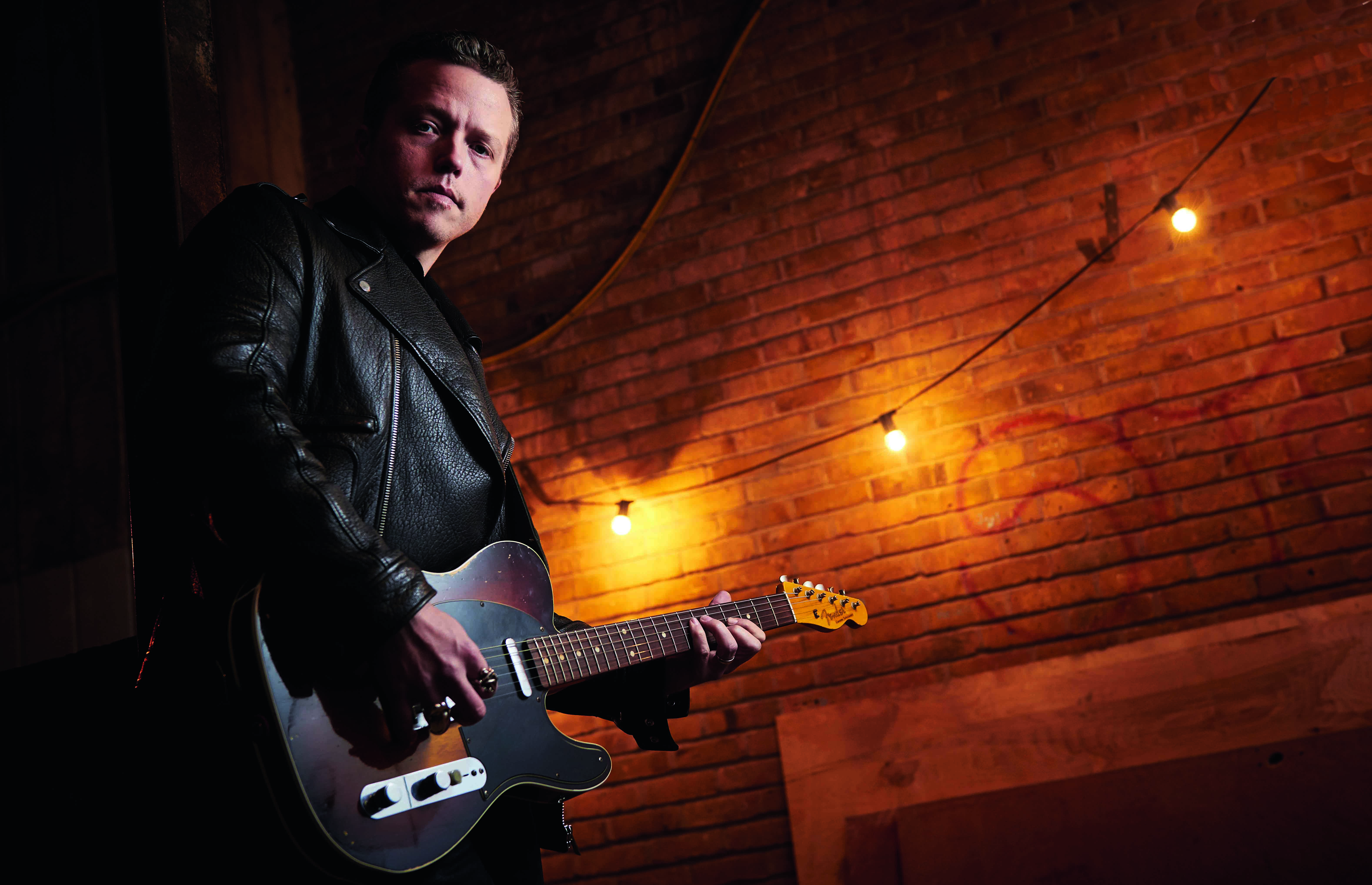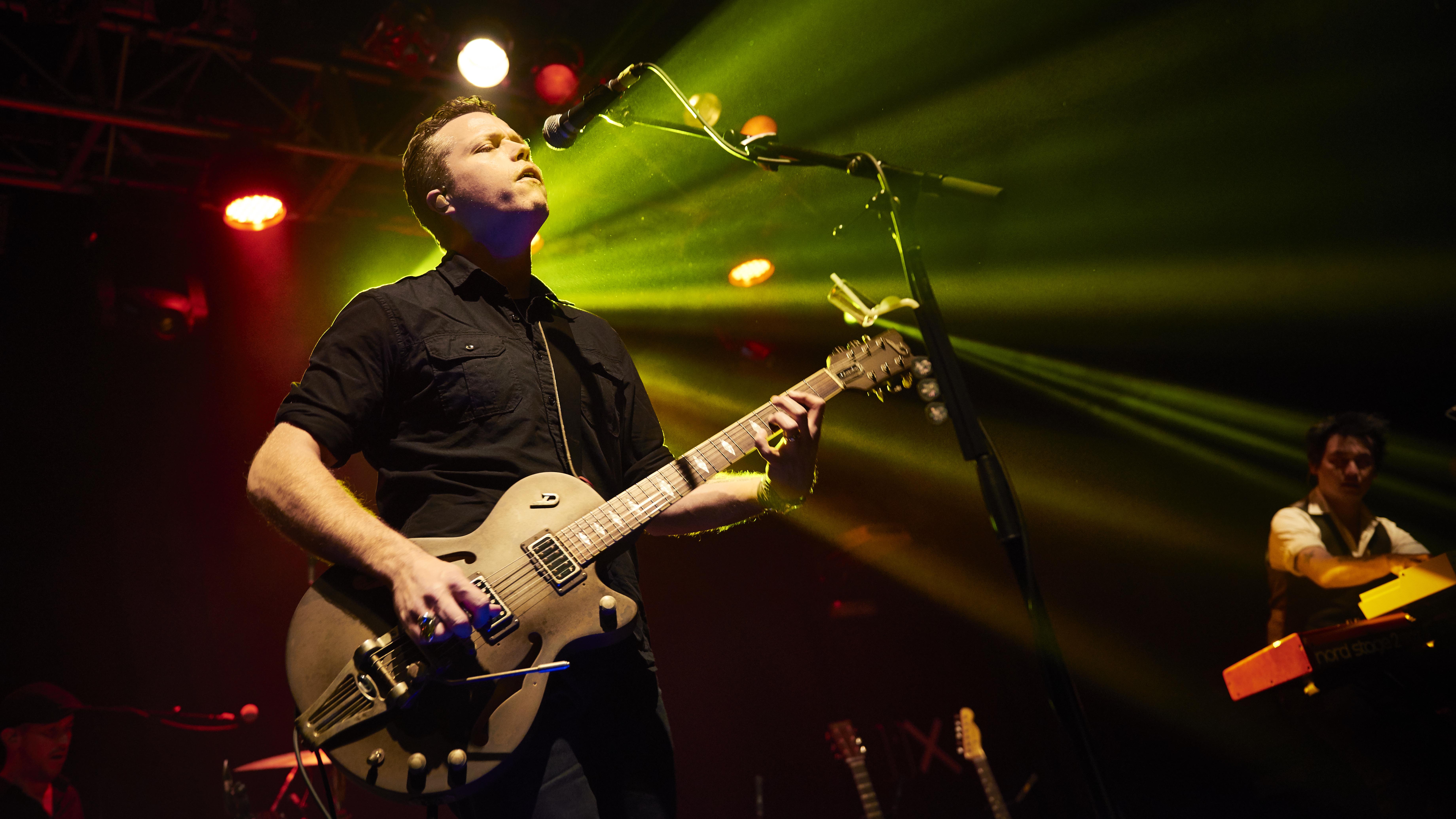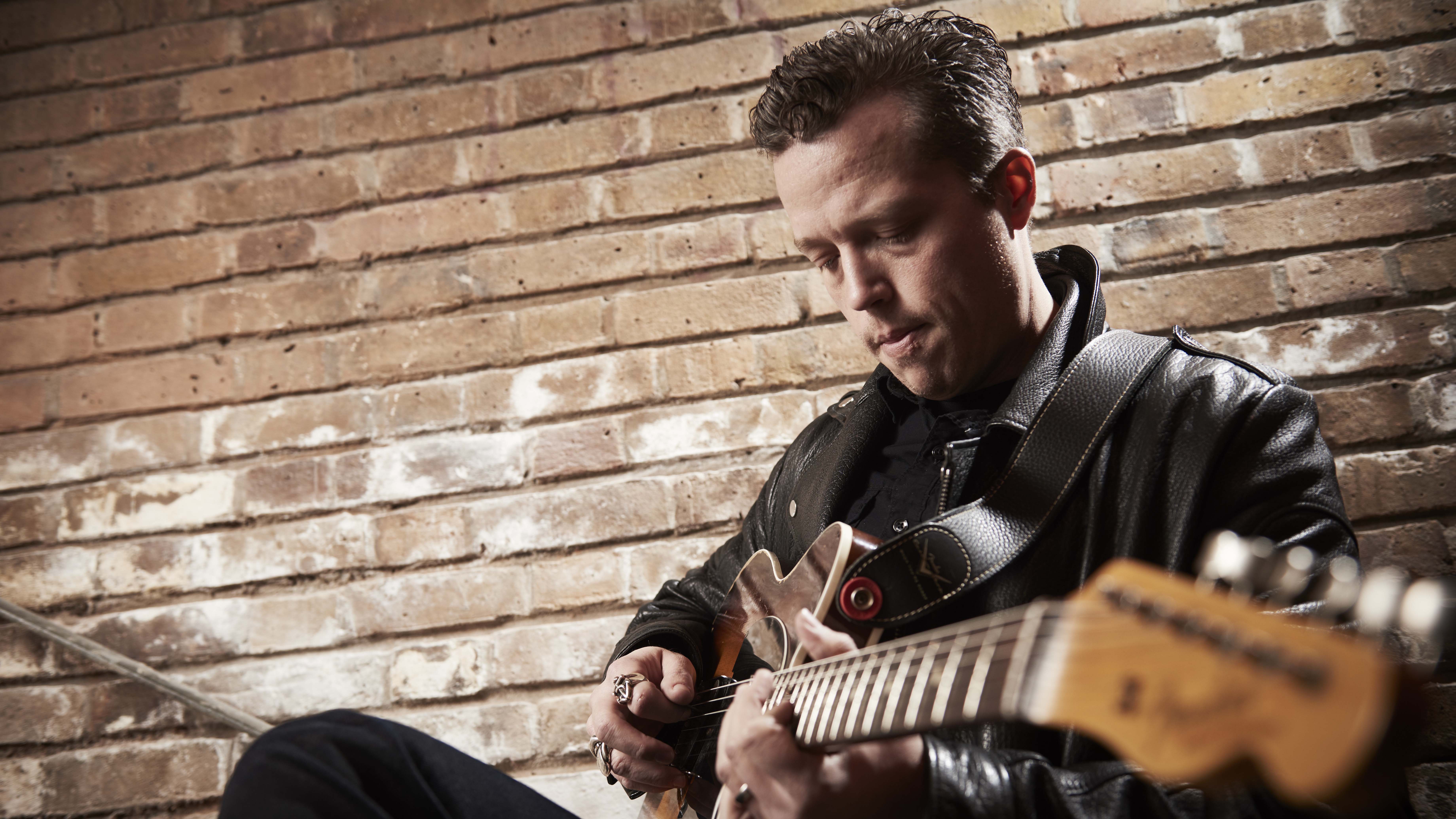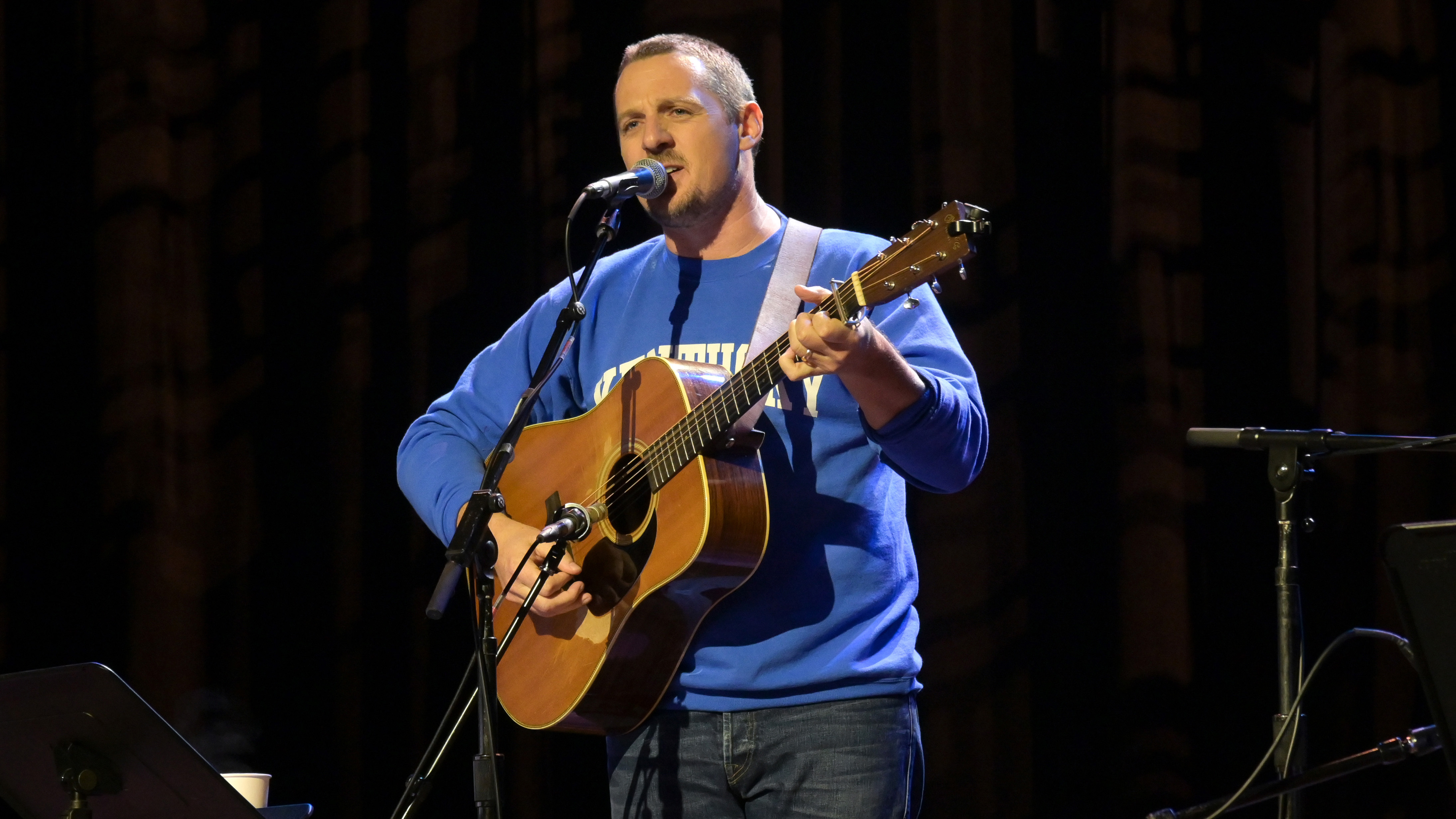
Want all the hottest music and gear news, reviews, deals, features and more, direct to your inbox? Sign up here.
You are now subscribed
Your newsletter sign-up was successful
In 2016 we sat down with Jason Isbell ahead of a show in Bristol with his band the 400 Unit to talk songwriting. With then-latest album Something More Than Free, he'd again proved to be one of America's key contemporary songwriters and further releases and Grammy wins since have cemented that. His insights on songwriting still hold true too…
“I don’t believe in writer’s block. I think that’s laziness,” Jason Isbell reveals early in our conversation. And hearing more about his dedicated approach to his craft, we begin to understand why he’s never short on ideas.
Thought-provoking lyricism, transcendent melody and expressive slide are cornerstones of Jason’s take on Americana
If Jeff Beck is the guitarist’s guitarist, it's likely Jason Isbell will become known as the songwriter's equivalent. Except, as he shows onstage when we catch him live with his backing band, the 400 Unit, he’s also got plenty of impressive moves as a guitar player in his own right too.

Perhaps that’s not so surprising from the Alabama-born artist who joined the Drive-By Truckers aged just 22 when their existing guitarist didn’t show up for an acoustic show, and he sat in with them instead.
A new songwriting talent soon began to shine in the hard-living band, one who was far ahead of his years; penning songs Decoration Day and Outfit that still appear in his own sets now. But after his battles with alcohol saw him depart the Drive-By Truckers in 2007, Jason set about forging a new identity as the solo artist we meet today.
"A great deal of it is paying really close attention to the lyric and the melody and trying to support those as well as possible"
His last two albums - 2013’s redemptive Southeastern and the Grammy Award-winning 2015 LP, Something More Than Free - have seen his name mentioned far and wide; and frequently by his own musical heroes.
Want all the hottest music and gear news, reviews, deals, features and more, direct to your inbox? Sign up here.
Thought-provoking lyricism, transcendent melody and expressive slide are cornerstones of Jason’s music, where he positions his guitar in a bigger picture.
“It’s another aspect of production,” Jason explains, “and it’s all in service to the song if you’re the type of songwriter that I am. You’ll get times when you get to show out as a player, but a great deal of it is paying really close attention to the lyric and the melody and trying to support those as well as possible.”
We talked to Jason about his roots and creative processes as a songwriter, and he offered plenty of valuable tips…
1. Start with your strings

“Being an instrumentalist first definitely helped me melodically. I had a little bit of a grasp on theory before I started writing my owns songs. It really helps because there are certain patterns.
“If you don’t know where to go, you can look at music theory and say, well maybe I’ll go to a flat seven for a bridge. Something that someone who’s feeling around in the dark might not know to look at… It keeps me able to come up with ideas and able to write things that are more pleasing to the ear. Things that cause tension and release.”
2. Keep your ears open
"That’s the first thing I do when I’m editing, try to find clichés"
“I just take a lot of notes, whether it be on my phone, laptop or actually written down in a notebook. I’ll revisit those when I get time to sit and write. I try to be really observant and play close attention, because people say things that are really poignant all the time. Most of it just slips in one ear and out the other.
“If you learn to focus on those things and pay attention to the world around you in a different way, the inspiration is always there. Then it just takes a lot of work really.
Some songs come quicker than others, but most of them I’ll spend a lot of time on just to make sure I’m saying exactly what I want to say and there’s no dead weight; any floral language that doesn’t really serve a purpose.
"And clichés; that’s the first thing I do when I’m editing, try to find clichés. If I’m not using them in an original way then I won’t use them at all.”
3. One lyric can inspire a song
“That’s happened with a lot of my songs. Travelling Alone was like that and I was at an airport singing what became the chorus into my cellphone [‘I’ve grown tired of travelling alone’].
"Then when I got home I was able to flesh out the rest of the song. Very often it will just start with one lyric like that. Something that has a good, natural phrasing to it - something that’s in a good meter.
“Travelling Alone started off very literal, that was what I was what I was actually doing; I was on a solo tour, so the meaning of that song was very specific and very literal [in the beginning]. Then as the song developed it took on more meanings.”
4. Free yourself to move between fact and fiction
"You can write about what you know, but you can still create a completely fictional story to explain yourself"
“That’s part of the beauty of it, you don’t have to delineate between any of those things. If you’re writing a song, you can use anything in the tool box; it can be your own experience, a story you’ve heard, something you completely made up.
“Songs aren’t categorised that way, movies and books are. If you go into a music store, it’s not shelved based on what’s true and what’s fiction. That to me is one of the thing’s that’s really attractive about songwriting; you can write about what you know, but you can still create a completely fictional story to explain yourself sometimes.
“I try not to let myself be restricted - when it comes to writing a song, the only rules I follow are rules of quality. As far as subject matter, or where the inspiration comes from, even if it’s mostly imaginary, I don’t care at all. I don’t think listeners care at all. Something can be true without ever having happened.”
5. A good story can teach you a lot about songwriting
" The more intake you have, the better your output’s going to be"
“I’ll take down notes if I read something that sticks with me. I’ll try to figure out how to build a song around it or work it into a song, the concept of it anyway - not necessarily a direct quote.
“It also teaches me what works and what doesn’t; how to advance a story, what details are important and which ones aren’t. It’s kind of like, if you’re going to be a chef you have to eat a lot, and you’re using ingredients no matter what you’re making.
“If you’re writing poems, songs or books, you’re using the same language and the same words. The more intake you have, the better your output’s going to be. If you read quality stuff then quality is going to come out.”
6. Thinking small can overcome performance anxiety
"If you do your homework, you can make the room as small as you want and it translates"
“When I’d just gotten sober, about four years ago, I went on tour with Ryan Adams and we were playing in big theatres. They were his shows and I was opening, but we were both playing solo acoustic. It was really challenging for me because I wasn’t really comfortable in the world [at the time] to start with and I was in front of a couple of thousand people with just me and a guitar.
“I remember him saying to me, ‘Just make the room small. Play as if you’re playing in your living room and keep yourself entertained. Play for the songs, rather than the audience.’
"I wouldn’t suggest doing that forever and I don’t think that’s what he meant, he meant that in order to get over that anxiety and really deliver a good show and not be afraid of the faces staring back at you, focus on the songs that you’ve written. If you do your homework, you can make the room as small as you want and it translates.”
7. The song comes first
"I can’t go and see a show unless the songs are strong"
“The live show is supposed to be a celebration; a celebration of the work you’ve done to get to that point and the songs you’ve written, the practising you’ve done and the time you’ve spent. You’re putting that on display and trying to create a community with the people in the room.

“I still feel like I’m a guitar player in a rock ’n’ roll band in a lot of ways. Even if I’m playing my own songs, it still feels like that. So there will be that element to the live show also. That will always be a big part of what I do. But if the songs aren’t there, I’ll lose interest in it.
“I can’t go and see a show unless the songs are strong. There are very few people who I can go and watch, and just watch them play guitar, maybe Marc Ribot, Bill Frisell, Adrian Belew could entertain me for a couple of hours without having songs particularly, but it’s very rare.”
8. Cast your musical net wide
"What they were calling grunge back then was very similar to blues music in a lot of ways"
“A lot of the music that was popular when I was 15 or 16 could very easily be called American roots music. What they were calling grunge back then was very similar to blues music in a lot of ways. It just happened to be that they’d broken their amps, and their guitars were all pieced together and they didn’t give a shit about much, or at least acted like they didn’t give a shit! But that was a form of roots music I think.
“I was also influenced by country music and then by a lot of the pop that was on the radio in the '80s and '90s. I think there was a lot of good pop made in those days; Squeeze and Crowded House, Prince… it’s amazing how talented Prince was.
"I do think growing up in that era and not purposefully avoiding those influences when I’m writing songs helps me to stay current.”
9. Honesty connects
"People have heard so many songs and stories and for you to really get through and write something that means something to somebody on a personal level, you’ve got to let yourself be honest"
To write something that means something to somebody on a personal level, you’ve got to let yourself be honest
“I think if you don’t feel that way, you’re not doing your job. You should at some point think, this is embarrassing or this paints me in a bad light, or somebody else in a bad light. You really have to look for the truth, and you have to tell the truth in the best way you can.
“I think the more honest you are with your audience, the more you’ll connect with them because they’ve heard so many songs. People have heard so many songs and stories and for you to really get through and write something that means something to somebody on a personal level, you’ve got to let yourself be honest, even when it’s difficult. Most importantly when it’s difficult. The hardest things, they always work out for the best.”
Jason Isbell and the 400 Unit's latest album Reunions is out now

Rob is the Reviews Editor for GuitarWorld.com and MusicRadar guitars, so spends most of his waking hours (and beyond) thinking about and trying the latest gear while making sure our reviews team is giving you thorough and honest tests of it. He's worked for guitar mags and sites as a writer and editor for nearly 20 years but still winces at the thought of restringing anything with a Floyd Rose.
